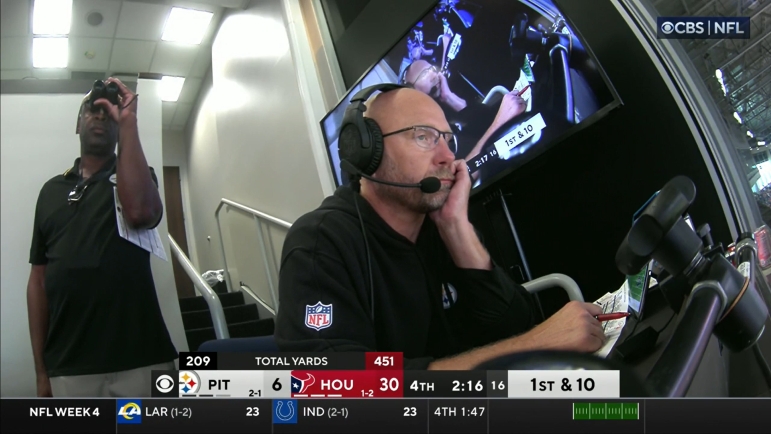At some point in the Week Four matchup between the Houston Texans and the Pittsburgh Steelers at NRG Stadium in Houston, CBS broadcaster Spero Dedas raised some eyebrows by revealing a conversation that he and color analyst Adam Archuleta had with Steelers offensive coordinator Matt Canada, in which Canada allegedly stated that his offense is “not built to come back from big leads.”
That became a talking point after the blowout loss to the Texans in which the Steelers racked up just 225 yards of total offense. It led to Steelers second-year quarterback Kenny Pickett being asked about it Wednesday, and then Canada on Thursday.
Though he’s been pretty even-keeled with the media throughout his tenure with the Steelers, Canada was a bit fiery on Thursday regarding the conversation with Dedas and Archuleta. He stated that “at no point was that conversation meant in that regard” that the Steelers can’t come back from big leads, adding that what he meant by the conversation was in regard to Week One and that the game plan against the San Francisco 49ers wasn’t built throughout the week to come back from big leads as it was important for the Steelers to get off to a good start.
“I’m glad you asked that question, because obviously [Steelers Communications Coordinator] Angela [Tegnelia] preps me on things. So, that was an unbelievable misinterpretation of a conversation so I’m going to take a real nice time and explain what that was,” Canada told reporters, according to video via ESPN’s Brooke Pryor. “Obviously, you guys all know, because you know everything about how it works, pregame we talk to those crews, talk about what’s going to happen. We try to give them information. The conversation was, why we ran more runs and play action against the Raiders versus the opening game. And why when you looked at the stat sheet it looked that way.”
“All we care about here is winning. …At no point was that conversation meant in that regard [that Steelers aren’t built to come back],” Canada said regarding the comments made to Dedas and Archuleta and what he meant from them from his point of view. “I certainly believe he knew that and obviously it was taken wrong.
“If not, of all the things we want to talk about and say, at no point do I doubt our players, doubt where we are, doubt we can come back. No doubts. I was literally saying that any football person would tell you, you’re down three scores with what’s that, 18 minutes to go? You gotta start going faster. You gotta start being in a two-minute mode. You have to score more points. That’s how that came out and certainly everybody on the offense is well aware of that.”
Regardless of a he-said, he-said situation between Canada, Dedas and Archuleta, there is quite a bit of truth to the comments he made in that setting ahead of the matchup with the Texans.
The Steelers aren’t built to be that high-flying, explosive passing game that can drag them out of a large deficit. It isn’t anything new, and it isn’t anything shocking, considering the 40-some game sample size of Canada as the Steelers’ offensive coordinator. The passing concepts are very basic and don’t threaten defenses all that much, and the Steelers don’t really hide their intentions with formations, concepts, etcetera.
When you have opposing players stating year after year that they know what’s coming from certain formations, that’s a problem. Pittsburgh can’t even put together a 400-yard output in today’s NFL in which the rules favor offenses. Is it really that hard to comprehend that the offense isn’t built to come back from big deficits?
Canada double down on his comments, too, later in his media session.
“I firmly believe that we’re built to come from behind. I firmly believe that with three minutes to go in the third quarter, we were still going to win the game. I firmly believed that we would get a stop and we’d go down and get the ball to Pat or GP [George Pickens] or Allen [Robinson], or whatever. Or make a big play and make it a two-score game,” Canada added, according to video via WTAE’s Emily Giangreco on Twitter. “Obviously, if we score there, which we didn’t, if we score there and it’s a two-score game, it’s completely different, right? We go out and get a stop, we can still run our plan that we were planning on running with runs and play actions and those types of things.
“The game’s wearing on, then it’s a one score game, then you’re there. When you’re down three scores, it changes how you’re going to go about that process. This is obviously talking all the way back to the opener. Again, we didn’t score enough points to win the game. Thats the bottom line. But that’s all that was said. I mean, I’ve stood up here for every time and said whatever it is, I’ve not placed any blame anywhere but me, but I’ve said every time that I believe 1000% in our players and our coaches. And if I’ve not been clear about that, I think i have been clear about that.”
Canada can be as fiery as he wants and be upset about how his comments were construed. That’s all fine and good.
Maybe that fire is there because the truth hurts.
He can have all the belief he wants in his players and believe they can come back from large deficits. There’s saying and doing, and the Steelers aren’t doing it, period. They haven’t come back from big deficits under Canada, and they aren’t going to start now. The scheme is very vanilla and easy to defend.
Everyone else can see that if the Steelers don’t get off to a good start offensively, they’re at a quick disadvantage, even a 7-0 hole. The Steelers don’t see it though, at least from a coaching and decision-making standpoint.








